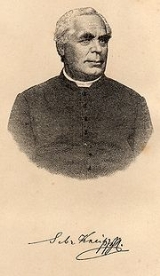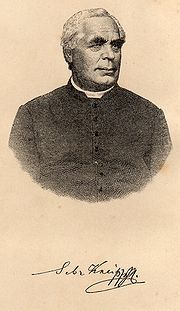
Sebastian Kneipp
Encyclopedia

Bavaria
Bavaria, formally the Free State of Bavaria is a state of Germany, located in the southeast of Germany. With an area of , it is the largest state by area, forming almost 20% of the total land area of Germany...
n priest and one of the founders of the Naturopathic medicine
Naturopathic medicine
Naturopathy, or Naturopathic Medicine, is a form of alternative medicine based on a belief in vitalism, which posits that a special energy called vital energy or vital force guides bodily processes such as metabolism, reproduction, growth, and adaptation...
movement. He is most commonly associated with the "Kneipp Cure" form of hydrotherapy, a system of healing involving the application of water through various methods, temperatures and pressures.
In Norway he is mostly known for his bread recipe based on whole wheat. Kneipbrød (Kneipp Bread) is the most commonly eaten bread in Norway.
Although most commonly associated with one area of Naturopathic medicine, Kneipp was the proponent of an entire system of healing, which rested on five main tenets:
- HydrotherapyHydrotherapyHydrotherapy, formerly called hydropathy, involves the use of water for pain-relief and treating illness. The term hydrotherapy itself is synonymous with the term water cure as it was originally marketed by practitioners and promoters in the 19th century...
- HerbalismHerbalismHerbalism is a traditional medicinal or folk medicine practice based on the use of plants and plant extracts. Herbalism is also known as botanical medicine, medical herbalism, herbal medicine, herbology, herblore, and phytotherapy...
– The use of botanical medicines. - Exercise
- NutritionNutritionNutrition is the provision, to cells and organisms, of the materials necessary to support life. Many common health problems can be prevented or alleviated with a healthy diet....
- A wholesome diet of whole grains, fruits & vegetables with limited meat - SpiritualitySpiritualitySpirituality can refer to an ultimate or an alleged immaterial reality; an inner path enabling a person to discover the essence of his/her being; or the “deepest values and meanings by which people live.” Spiritual practices, including meditation, prayer and contemplation, are intended to develop...
- Kneipp believed that a healthy mind begot a healthy person
In the 19th century, there was a popular revival in the application of hydrotherapy instigated around 1829, by Vincent Priessnitz, a peasant farmer in Gräfenberg
Lázne Jeseník
Lázně Jeseník is a small village in the Olomouc Region of the Czech Republic. It is administratively part of the city of Jeseník ....
, then part of the Austrian Empire
Austrian Empire
The Austrian Empire was a modern era successor empire, which was centered on what is today's Austria and which officially lasted from 1804 to 1867. It was followed by the Empire of Austria-Hungary, whose proclamation was a diplomatic move that elevated Hungary's status within the Austrian Empire...
. This revival was continued by Kneipp, "an able and enthusiastic follower" of Priessnitz, "whose work he took up where Priessnitz left it", after he came across a treatise on the cold water cure. Kneipp's own book My Water Cure was published in 1886 with many subsequent editions, and translated into many languages.
During his time in Bad Wörishofen, Kneipp was able to counsel many people. Tens of thousands came from all over the world to receive his healing advice.
He was the author of the books "My Water Cure", "Thus Shalt Thou Live", and "My Will".
External links
- Kneipp: Wasserkur (Hydrotherapie) (My Water Cure, original, German language, fulltext)
- Kneipp

